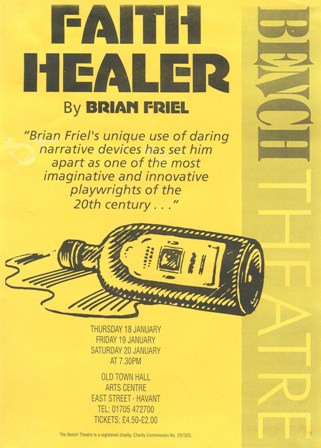The Bench Production

This play was staged at Havant Arts Centre, East Street Havant - Bench Theatre's home since 1977.
Characters
| Frank | David Penrose |
| Grace | Nicola Scadding |
| Teddy | Vincent Adams |
Crew
| Director | Damon Wakelin |
| Stage Manager | Paul McMahon |
| Assistant Stage Manager | Rob Bartlett |
| Lighting Design | Steve Wilkins |
| Lighting Operation | Steve Wilkins |
| Leaflet Design | Pete Woodward |
| Costume Design | John O'Hanlon Kathy O'Hanlon |
| Set Design | Damon Wakelin |
Director's Notes
Faith Healer is, on the surface, the story of "The Fantastic Francis Hardy, Faith Healer", a man endowed with a gift, the ability to cure the sick. It is an erratic, unpredictable power, one that often frustrates but occasionally astounds.
Yet Friel makes no attempt to explain or dismiss, prove or disprove the nature of this power; its origins are never sought or shown and he does not judge as to whether Frank is blessed or cursed.
Instead, through the medium of three intensely private personal histories all relating to a world of shared experience, we explore interweaving themes of faith itself (in humanist, non-secular terms) and truth and how we perception alters truth; we walk the thin line between eloquence and violence and share the protagonists' disappointments, disappointments made all the more profound because they are haunted by the possibility of a miracle and by the hope that hope still exists.
Bench regulars will recognise Friel as the author of Dancing at Lughnasa which was successfully produced by the company in July 1995. Indeed the Portsmouth News was moved in its review to describe it as "compelling" and "utterly convincing". Certainly audience reactions since confirm it as one of the most fondly regarded productions of recent times. I hope 'Faith Healer', described on its release on Broadway as "the finest play to come out of Ireland since J.M. Synges' 'Playboy of the Western World', will be just as favourably received.
Damon Wakelin
previous production next production